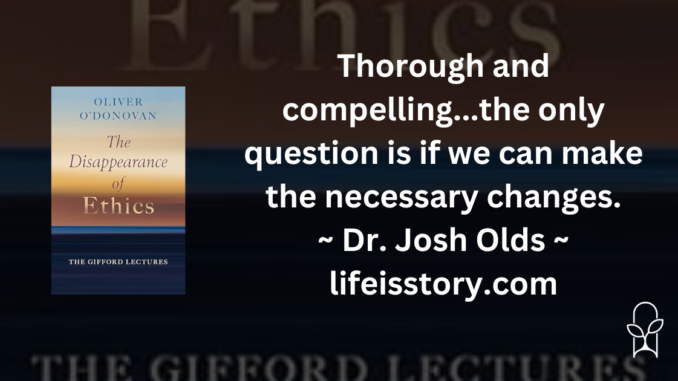
Series: Gifford Lectures
Published by Eerdmans on January 24, 2024
Genres: Academic
Buy on Amazon
Goodreads

The capstone lectures of esteemed ethicist Oliver O’Donovan; What is the future of ethics? Oliver O’Donovan addresses a discipline in crisis in The Disappearance of Ethics . Based on the 2021 Gifford Lectures, this book contends that contemporary ethics has lost its object (good), frontier (time), and agent (person). O’Donovan traces the development of these concepts from Greek philosophy through early Christianity, the Enlightenment, and into the modern era. Engaging with a range of thinkers including Aristotle, Augustine of Hippo, Max Scheler, Karl Barth, and more, O’Donovan shows how ethics has lost its heart and how the field can regain its purpose. He completes his lectures by integrating theology and philosophy to recover ethics. Contemplating theological concepts such as creation, divine law, and justification undergirds ethics by generating “existential wonder.” With characteristic warmth and scholarly precision, O’Donovan reinvigorates ethical argument with theological insight. Scholars and students of Christian ethics will find his lectures equally provocative and inspiring.
The Gifford Lectures were established in 1887 at the four ancient universities of Scotland—St Andrews, Glasgow, Aberdeen, and Edinburgh—to promote the study of natural theology. Speaking at a Gifford is one of the most prestigious honors in Scottish academia. While not every lecture series gets a book treatment, many do, and The Disappearance of Ethics is the second to be published by William B. Eerdmans.
Based on Oliver O’Donovan’s 2021 lecture (which was done via Zoom due to the Coronatimes), the book makes the case that contemporary ethics has become lost, having misplaced its object (what is good), its frontier (the aspect of time), and its agent (people). If all of this seems a little heady, then buckle up because this is a prestigious academic lecture series has no problem living in academic prose.
O’Donovan is a British priest and academic, who served as professor of moral and pastoral theology at Oxford for nearly 25 years, then did a further seven as professor of ethics and practical theology at Edinburgh. He’s a past president of the Society for the Study of Christian Ethics and associate director of Centre for Theology and Public Issues. His magnum opus is a trilogy called Ethics as Theology, also published by Eerdmans between 2013-2017. I say this only to note that when it comes to the field of Christian ethics, O’Donovan has been a fixture for forty years.
And that’s why, when he proclaims the disappearance of ethics, no matter how academic or scholarly he might make it sound, we should be alarmed. Where has ethics gone? By this, O’Donovan doesn’t necessarily mean that people lack character. It’s not a “kids these days” man angrily shaking his fist about how things were better in his day. Rather, it’s a lament that Christian theology and thinking have neglected the study of ethics and that has impacted our moral reasoning. The revitalization of ethics will come with a revitalization of theology and commit to live as Spirit-indwelt beings in this world.
So there is only question left: Why read the book if you can just listen to the lectures for free? And yes, it’s true that the Gifford lectures are freely available. However, there are those who learn better through reading than listening. Reading is a more active skill than listening. Second, this book has been edited, expanded, and annotated to ensure a more robust product. But perhaps most importantly is that, given that Dr. O’Donovan gave his 2021 lecture via Zoom, the video and audio quality is, well, less than desirable. I usually listen through the Giffords but this one definitely suffered from an inability to have any sort of production value.
In the end, The Disappearance of Ethics makes its case well. O’Donovan is thorough and compelling. The question that remains is if we can make the necessary changes to bring back what has been lost.
